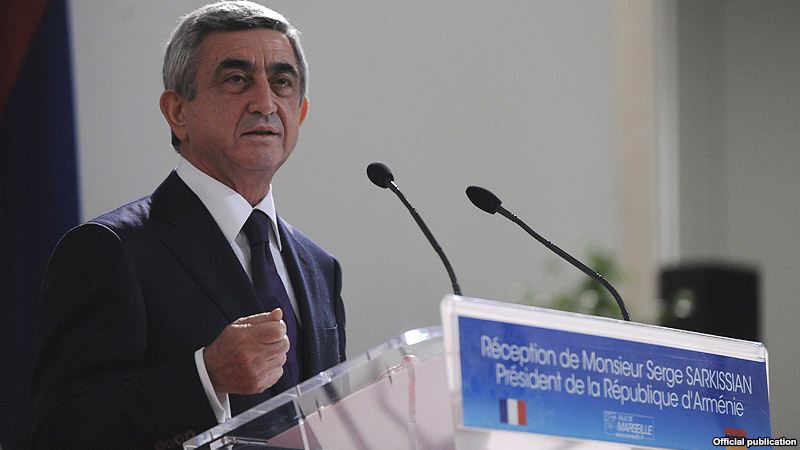BY JACKIE SPEIER and ADAM SCHIFF
San Francisco Chronicle
Published: Monday, Feb. 1, 2021
In the past few weeks, the world witnessed the triumph of American democracy over a would-be autocrat, culminating in the peaceful transfer of power on Jan. 20. Yet, the extraordinary foreign and domestic challenges facing President Biden could not be more apparent. He now has the opportunity to reshape a U.S. foreign policy that under President Donald Trump has departed from our core democratic interests and values.
An early test for President Biden is found in a small and often overlooked enclave in the South Caucasus region known as Nagorno-Karabakh.
Nagorno-Karabakh is a disputed territory, which in the bloody and chaotic final days of the Soviet Union arose as a semi-autonomous region closely tied to Armenia and home to roughly 150,000 residents. Artsakh, as it’s known in Armenia, has existed in an uneasy state for decades, landlocked and facing frequent attacks by Azerbaijani forces, but peaceful enough to allow its residents to grow and build a budding democracy.
Until September. Following years of tension, sporadic violence over the region’s status, and the Azerbaijani government’s frequent threats of military force and ethnic cleansing, Azerbaijan, with the assistance of Turkey, launched a full-scale assault with devastating consequences. Over the course of a brutal six-week war, sophisticated drones targeted Armenian soldiers from the air, mercenaries sent by Turkey fortified Azeri ground forces, and Azerbaijan overran Armenian defenses. After violating three internationally negotiated ceasefires, Azerbaijan’s forces advanced to within miles of the capital city of Stepanakert before a Russian-brokered agreement ended the fighting.
The cost of peace to protect Armenian civilians was high. Armenia was forced to relinquish control over large portions of Nagorno-Karabakh, with only the presence of a small Russian peacekeeping force to prevent further bloodshed and attacks on Armenian civilians.
Sadly, as this devastating outcome played out, the United States made only a half-hearted and ineffectual effort to end the fighting and ceded the primary leadership role to others. Russia stepped into the void. It will now be up to the Biden administration to unwind this disastrous outcome.
Biden has signaled he will focus on restoring the United States as a force for democracy and human rights around the world. This conflict and its aftermath represent an opportunity to do just that. It pits a democratic Armenia and Artsakh against autocratic regimes in Baku and Ankara who abuse human rights, imprison reporters and dissidents, and crush dissent. We must lead with our values instead of perpetuating a transactional foreign policy that looks the other way as Azerbaijan invades its neighbors and commits human-rights violations at home and abroad.
Our first task is perhaps the simplest — we must reassert ourselves diplomatically and with urgency.
The OSCE Minsk Group, consisting of the United States, Russia, and France, was established in 1992 as the forum for diplomatic resolution of Nagorno-Karabakh’s status. We must reinvigorate and reengage with the Minsk Group process and seize the opportunity to secure the release of over 150 Armenian prisoners of war still held by Azerbaijan, demand the protection of historic Christian churches and cultural landmarks throughout Nagorno-Karabakh, and seek accountability for apparent war crimes against Armenian civilians and soldiers. We must also provide additional humanitarian assistance to the tens of thousands of displaced people who have fled for fear of their lives.
Second, we must end our silence on Azerbaijan’s and Turkey’s regional aggression and halt military aid to Azerbaijan, which has totaled over $100 million in the past two years. A country that shatters international norms to threaten and invade its neighbor is not one that U.S. taxpayers should be aiding and abetting.
We must also reassess our relationship with Turkey, which has always been complex, but has become increasingly untenable as Turkish President Recep Tayyip Erdogan has amassed autocratic powers while undermining U.S. interests. In addition to encouraging, arming, and supplying Syrian mercenaries to wage war in Nagorno-Karabakh, Turkey’s actions in Syria have set back U.S. interests and endangered our forces. Turkey even recently tested a new Russian anti-aircraft system that could weaken NATO’s military advantage over Russia, despite our strong objections and threat of sanctions.
Finally, President Biden can make a strong and early endorsement of human rights by recognizing the Armenian Genocide in April.
In 2019, Congress voted overwhelmingly for the first time in decades to directly acknowledge the murder of 1.5 million Armenians from 1915 to 1923 by the Ottoman Empire as a genocide. The Armenian Genocide’s wounds can never heal, but they are particularly painful at a time when Armenians once again face threats of ethnic cleansing, as both Erdogan and Azerbaijani President Ilham Aliyev echo the genocidal language of a century ago. Presidential recognition of the Armenian Genocide will reverberate across the world, making clear that America stands for human rights and against denial.
On Jan. 6, America prevailed against the malevolent and persistent forces seeking to overturn democracy. We must once again lead by example by strengthening democratic institutions and norms abroad and at home. In the South Caucasus, we can act in support of the fundamental human right to self-determination and against the settlement of territorial disputes through the application of military force.
As the values of human rights, democracy and freedom increasingly come under assault by autocrats, America’s leadership is needed more than ever. Our allies and adversaries are watching closely.
Jackie Speier represents the 14th District (northern Peninsula, slice of San Francisco) in the U.S. House of Representatives; Adam Schiff represents the 28th District (Los Angeles area) in the U.S. House of Representatives. They are co-chairs of the Congressional Armenian Caucus.










